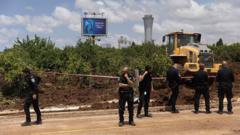In a show of military might, Israel has carried out airstrikes on Houthi positions in Yemen, marking a significant escalation in the ongoing conflict connected to missile threats against its territory.
### Israel Launches Airstrikes on Houthi Targets in Yemen Following Missile Attack

### Israel Launches Airstrikes on Houthi Targets in Yemen Following Missile Attack
Israel responds decisively to Houthi missile strike aimed at Ben Gurion airport, escalating tensions in the region.
Israel's military officials confirmed that the strikes targeted what they described as crucial supply sources for the Houthi movement, particularly focusing on sites in Hudaydah Port and a cement factory in Bajil. This action follows a Houthi missile attack on Ben Gurion airport, which had landed near the terminal, injuring six people. Following their missile strike, the Houthi group has stated intentions to escalate their operations against Israeli airports and vowed to enforce a comprehensive aerial blockade.
As reported, the Houthis accused both Israel and the United States of joint aggression, leading to casualties from the Israeli strikes in Hudaydah, including claims of 21 individuals injured. The IDF emphasized that the strikes were conducted with measures in place to avoid harm to civilian vessels at the port, which is a critical point for Yemen's food imports.
Israeli Prime Minister Benjamin Netanyahu reiterated the country's policy towards retaliation against threats, declaring that Israel will continue to strike back against aggressions aimed at its civilians. Iran, while taking a side with the Houthis, claimed that the missile attacks were an independent decision made by the Yemeni group.
The situation highlights the broader implications of regional alliances and the ongoing conflict involving the US, which has also engaged in targeting Houthi positions in Yemen. The airstrikes demonstrate not only local military engagements but also significant geopolitical maneuvers involving major powers. This latest development poses questions about how these ongoing conflicts may evolve, particularly amid the complexities of Iran's influence in the region and its support for the Houthis.
The dynamics of this situation, especially regarding responses from both Iran and the US as well as implications for Israel's security strategy, remain to be closely monitored as tensions continue to rise across the region.
As reported, the Houthis accused both Israel and the United States of joint aggression, leading to casualties from the Israeli strikes in Hudaydah, including claims of 21 individuals injured. The IDF emphasized that the strikes were conducted with measures in place to avoid harm to civilian vessels at the port, which is a critical point for Yemen's food imports.
Israeli Prime Minister Benjamin Netanyahu reiterated the country's policy towards retaliation against threats, declaring that Israel will continue to strike back against aggressions aimed at its civilians. Iran, while taking a side with the Houthis, claimed that the missile attacks were an independent decision made by the Yemeni group.
The situation highlights the broader implications of regional alliances and the ongoing conflict involving the US, which has also engaged in targeting Houthi positions in Yemen. The airstrikes demonstrate not only local military engagements but also significant geopolitical maneuvers involving major powers. This latest development poses questions about how these ongoing conflicts may evolve, particularly amid the complexities of Iran's influence in the region and its support for the Houthis.
The dynamics of this situation, especially regarding responses from both Iran and the US as well as implications for Israel's security strategy, remain to be closely monitored as tensions continue to rise across the region.





















